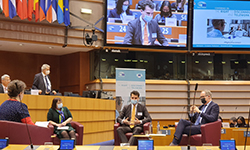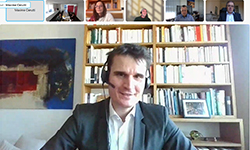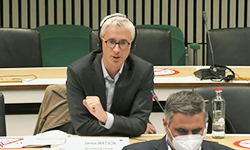BusinessEurope Headlines No. 2022-09
Dealing with Ukrainian refugee crisis not losing sight of EU economic migration policy goals

Three million Ukrainian nationals have fled the war in Ukraine already. Employers’ organisations and companies are ready to do what they can to help Ukrainian refugees with their labour market integration. It is at the national level where concrete action needs to be taken, with public authorities playing the lead role throughout the integration chain. BusinessEurope remains committed to cooperation with the European Commission and the other EU economic and social partners as part of the existing EU partnership on refugee integration. On top of this, it is vital that we do not lose sight of our medium to long-term objectives for the EU’s economic migration policy, which will play a key role in the coming years notably for Europe to compensate for the shrinking EU working age population. These were among the key messages given by BusinessEurope Director General Markus J. Beyrer during a meeting with European Commissioners Ylva Johansson (Home Affairs) and Nicolas Schmit (Jobs and Social Rights) on 17 March. BusinessEurope encourages the Commission to go ahead with its upcoming skills and talent package, which is set to be published at the end of April. In particular, BusinessEurope looks forward to assessing the Commission’s proposals for the design of an EU Talent Pool and to feeding into the preparatory discussions for setting this up.
Contact: Robert Plummer
Photos copyright: European Union
Our comment
Women on boards: a long journey reaching its end
By Pedro Oliveira, Director for Legal Affairs and Linn Oetterli, Junior Adviser for Legal Affairs
 On Monday 14 March, the Council of the EU adopted its general approach on the directive proposal on improving the gender balance among non-executive directors of companies listed on stock exchanges and related measures, COM (2012) 614. The proposal had been presented by the Barroso Commission in 2012 under the hand of Vice President Viviane Reding and it has since been blocked in the Council. It sets two alternative non-binding minimum targets that companies are deemed to achieve: 40 percent for the proportion of non-executive board members of the underrepresented sex by 2027 or 33 percent of the total board positions by the underrepresented sex by 2027. The proposal also introduces a few procedural rules for the selection and appointment of non-executive board members. Companies not reaching one of the above two targets would be required to continue to apply the procedural rules, as well as to explain what measures they have taken - and intended to take in the future - to reach the thresholds. The proposal also foresees circumstances that grant Member States a suspension to the application of the directive (e.g. national quotas or the quantitative thresholds have been met already).
On Monday 14 March, the Council of the EU adopted its general approach on the directive proposal on improving the gender balance among non-executive directors of companies listed on stock exchanges and related measures, COM (2012) 614. The proposal had been presented by the Barroso Commission in 2012 under the hand of Vice President Viviane Reding and it has since been blocked in the Council. It sets two alternative non-binding minimum targets that companies are deemed to achieve: 40 percent for the proportion of non-executive board members of the underrepresented sex by 2027 or 33 percent of the total board positions by the underrepresented sex by 2027. The proposal also introduces a few procedural rules for the selection and appointment of non-executive board members. Companies not reaching one of the above two targets would be required to continue to apply the procedural rules, as well as to explain what measures they have taken - and intended to take in the future - to reach the thresholds. The proposal also foresees circumstances that grant Member States a suspension to the application of the directive (e.g. national quotas or the quantitative thresholds have been met already).
BusinessEurope has always supported the goal of the proposal, namely to increase the proportion of women in companies, but we also believe this should be encouraged at all company levels. Recent statistics[1] show that gender quota laws for corporate positions do not necessarily lead to more women in leadership positions in companies, such as CEOs. Also, there are many underlying reasons (e.g. social, cultural, educational) for the lack of women on boards and while quantitative targets can increase numbers, they do not address the root causes of underrepresentation.
Achieving the right mix of talents, skills and experience is key for all businesses and diversity in boards is a synonym for innovation, creativity, and good governance. However, diversity is so much more than gender. When striving for diverse boards, companies should hold flexibility to appoint board members with the most suited knowledge, experience and personal qualities.
Furthermore, board nomination procedures differ among Member States both in process and in board cycles. This is why BusinessEurope’s main concern regarding the proposal has been the level of detail of provisions around board nomination procedures which risk to disproportionately interfere with national company law systems and with the property rights of shareholders. The Council position adopted earlier this week is more workable from the point of view of subsidiarity, for example by granting Member States more flexibility on the suspending clauses.
In view of the upcoming trilogue negotiations between co-legislators, BusinessEurope supports ensuring that the principle of subsidiarity remains a key feature. Different measures adopted by Member States in the past 10 years – binding and non-binding – demonstrate that there are different, equally effective, paths to achieve progress in representation of women in boards.
Fostering cohesion through support for employment participation and skilling
 Labour market participation is crucial for cohesion in our societies. EU countries currently face serious labour force and skills shortages as well as the growing need to up and re-skill the workforce in view of the digital and green transitions. The cohesion funds, in particular the European Social Fund Plus (ESF+) play a crucial role in supporting the implementation of structural reforms that can address these priorities. In targeting the use of the funds, it is essential to take into account the priorities of the social partners who are uniquely placed to help national governments design and implement labour market reforms. Where needed, this also requires the allocation of capacity building support for national social partners via the ESF+ in order that they can fully play their role. These were the key messages given by BusinessEurope Director General Markus J. Beyrer during the Cohesion Forum that took place on 17 March. In the context of the situation in Ukraine, BusinessEurope also welcomes the flexibility that the Cohesion Action for Refugees in Europe (CARE) programme will afford Member States and regions to reallocate available funding under the 2014-2020 period. This is another demonstration of European solidarity and cohesion.
Labour market participation is crucial for cohesion in our societies. EU countries currently face serious labour force and skills shortages as well as the growing need to up and re-skill the workforce in view of the digital and green transitions. The cohesion funds, in particular the European Social Fund Plus (ESF+) play a crucial role in supporting the implementation of structural reforms that can address these priorities. In targeting the use of the funds, it is essential to take into account the priorities of the social partners who are uniquely placed to help national governments design and implement labour market reforms. Where needed, this also requires the allocation of capacity building support for national social partners via the ESF+ in order that they can fully play their role. These were the key messages given by BusinessEurope Director General Markus J. Beyrer during the Cohesion Forum that took place on 17 March. In the context of the situation in Ukraine, BusinessEurope also welcomes the flexibility that the Cohesion Action for Refugees in Europe (CARE) programme will afford Member States and regions to reallocate available funding under the 2014-2020 period. This is another demonstration of European solidarity and cohesion.
Contact: Robert Plummer
Taxonomy: focus on implementation
 “The EU Taxonomy can be a valid tool to support the green transition”, BusinessEurope Deputy Director General Alexandre Affre stressed at the event “EU Taxonomy: impacts on other policies”, organised by the European Roundtable on Climate Change and Sustainable Transition (ERCST) on 11 March. This has also been the approach of BusinessEurope in supporting this initiative since the European Commission’s proposal in 2018. “However, we should not forget that the Taxonomy is a brand new instrument which is extremely complex to implement”, he explained. A number of technical screening criteria and the reporting requirements are unclear and thus raise usability and coherence questions. Affre concluded that “the Commission should now address these challenges to effectively establish a dictionary of green activities. It is instead too soon to talk about extensions or using the Taxonomy for other objectives than for those it was created in the first place”.
“The EU Taxonomy can be a valid tool to support the green transition”, BusinessEurope Deputy Director General Alexandre Affre stressed at the event “EU Taxonomy: impacts on other policies”, organised by the European Roundtable on Climate Change and Sustainable Transition (ERCST) on 11 March. This has also been the approach of BusinessEurope in supporting this initiative since the European Commission’s proposal in 2018. “However, we should not forget that the Taxonomy is a brand new instrument which is extremely complex to implement”, he explained. A number of technical screening criteria and the reporting requirements are unclear and thus raise usability and coherence questions. Affre concluded that “the Commission should now address these challenges to effectively establish a dictionary of green activities. It is instead too soon to talk about extensions or using the Taxonomy for other objectives than for those it was created in the first place”.
Contact: Carolina Vigo
WTO: how G7 can best support multilateralism
 “The World Trade Organisation (WTO) 12th Ministerial meeting taking place in June will be critical in defining the future of multilateral trade, whether it is possible to agree on a path to modernise existing rules and address the shortcomings in the dispute settlement system”, said Luisa Santos, Deputy Director General of BusinessEurope at the panel discussion “Reforming the WTO: Can the G7 give a fresh impetus?”, organised by the G7 German Presidency on 11 March. She added that in view of increasing divergencies between developed and developing economies regarding WTO priorities, it is fundamental that G7 countries present a united front in terms of modernisation of rules, dispute settlement and overall priorities for the multilateral trading system. “The close coordination among G7 in responding to Russia’s invasion of Ukraine it’s a good example that should also be followed in the WTO context”, Santos highlighted. Talking about the role of business, she stated that the business community in G7 countries is strongly committed to multilateralism and rules-based trade. It gives companies legal certainty and rules a significant portion of the trade and investment flows with many of our major trading partners. “At the same time, these rules need to be updated. They are not capturing today’s main societal challenges like the green and digital transformations and they don’t address existing distortive practices that hamper our competitiveness”, she concluded.
“The World Trade Organisation (WTO) 12th Ministerial meeting taking place in June will be critical in defining the future of multilateral trade, whether it is possible to agree on a path to modernise existing rules and address the shortcomings in the dispute settlement system”, said Luisa Santos, Deputy Director General of BusinessEurope at the panel discussion “Reforming the WTO: Can the G7 give a fresh impetus?”, organised by the G7 German Presidency on 11 March. She added that in view of increasing divergencies between developed and developing economies regarding WTO priorities, it is fundamental that G7 countries present a united front in terms of modernisation of rules, dispute settlement and overall priorities for the multilateral trading system. “The close coordination among G7 in responding to Russia’s invasion of Ukraine it’s a good example that should also be followed in the WTO context”, Santos highlighted. Talking about the role of business, she stated that the business community in G7 countries is strongly committed to multilateralism and rules-based trade. It gives companies legal certainty and rules a significant portion of the trade and investment flows with many of our major trading partners. “At the same time, these rules need to be updated. They are not capturing today’s main societal challenges like the green and digital transformations and they don’t address existing distortive practices that hamper our competitiveness”, she concluded.
Contact: Sofia Bournou
International procurement: business welcomes long-awaited instrument
 After ten long years of discussions, on 14 March the EU institutions finally agreed on the International Procurement Instrument (IPI). Commenting on the breakthrough BusinessEurope’s Director General Markus J. Beyrer said: “European business has long been waiting for an instrument that re-establishes a level playing field in international procurement markets. More than ever European companies need new business opportunities in third countries to support our economic recovery and diversify our markets”. The IPI, he added, should give the EU extra leverage in negotiating with third countries while safeguarding the competitiveness of our companies in the single market. “Implementation will be key to ensure the instrument works and effectively creates more competitive conditions for our companies abroad and in the EU”, he concluded.
After ten long years of discussions, on 14 March the EU institutions finally agreed on the International Procurement Instrument (IPI). Commenting on the breakthrough BusinessEurope’s Director General Markus J. Beyrer said: “European business has long been waiting for an instrument that re-establishes a level playing field in international procurement markets. More than ever European companies need new business opportunities in third countries to support our economic recovery and diversify our markets”. The IPI, he added, should give the EU extra leverage in negotiating with third countries while safeguarding the competitiveness of our companies in the single market. “Implementation will be key to ensure the instrument works and effectively creates more competitive conditions for our companies abroad and in the EU”, he concluded.
Contact: Sofia Bournou
Social partners best suited to regulate telework and disconnection
 Joint approaches between social partners, at appropriate levels, are the best way to optimise the benefits and tackle the challenges related to telework and connection and disconnection. This was the key message of Maxime Cerutti, BusinessEurope Director for Social Affairs at the joint European Commission – European Parliament conference on 15 March on telework and the right to disconnect. Cerutti called on EU policy makers to respect the autonomy of social partners and leave them the space to deal with these topics, highlighting that “we’re ready to seek a mandate with our members to engage in negotiations with the trade unions on these issues.” He also highlighted the need to recognise not only the challenges but also opportunities that digital tools bring for workers and employers, allowing for more autonomy, flexibility and better work-life balance. “The key is making sure that use of digital devices is well managed. Employers have a crucial role, for example in terms of work organisation, but so do individual workers in terms of managing their own use, with necessary support of management”, he concluded.
Joint approaches between social partners, at appropriate levels, are the best way to optimise the benefits and tackle the challenges related to telework and connection and disconnection. This was the key message of Maxime Cerutti, BusinessEurope Director for Social Affairs at the joint European Commission – European Parliament conference on 15 March on telework and the right to disconnect. Cerutti called on EU policy makers to respect the autonomy of social partners and leave them the space to deal with these topics, highlighting that “we’re ready to seek a mandate with our members to engage in negotiations with the trade unions on these issues.” He also highlighted the need to recognise not only the challenges but also opportunities that digital tools bring for workers and employers, allowing for more autonomy, flexibility and better work-life balance. “The key is making sure that use of digital devices is well managed. Employers have a crucial role, for example in terms of work organisation, but so do individual workers in terms of managing their own use, with necessary support of management”, he concluded.
Contact: Rebekah Smith
The future of social protection mainly depends on increasing employment in Europe
 The need to modernise social protection systems is mainly driven by the need to secure social protection sustainability and adequacy over the long-term in the face of demographic ageing and the expected rapid increase of old-age dependency in our societies. There is also the need to adapt social protection provisions to changing economic and social needs, notably deriving from the twin digital and green transitions. This needs to be done in a way which appropriately balances economic and social objectives. Increasing employment in Europe is the main solution to ensure adequacy and sustainability of social protection systems over the long-term. Potential reallocation of funds or saving options should be considered at the national level to ensure that the resources available are used effectively, focusing on where they are mostly needed. These were the main messages conveyed by Maxime Cerutti, BusinessEurope Social Affairs Director during a meeting organised by the European Commission’s Directorate-General for Employment, Social Affairs and Inclusion on 8 March, and attended by a number of members of the High-Level Experts’ Group on the future of social protection and the welfare state and social partners. Cerutti added that improved tripartite cooperation between public authorities and social partners at EU and national levels is crucial for effective social protection systems to provide the right incentives for employers and workers suited to modern labour markets, diverse career paths and work preferences. BusinessEurope calls on the Commission to take two concrete steps that can help modernising social protection systems: first, setting up at EU level a new tripartite advisory committee on social protection, and second, publishing a yearly report on national trends towards improved efficiency of public spending on social protection.
The need to modernise social protection systems is mainly driven by the need to secure social protection sustainability and adequacy over the long-term in the face of demographic ageing and the expected rapid increase of old-age dependency in our societies. There is also the need to adapt social protection provisions to changing economic and social needs, notably deriving from the twin digital and green transitions. This needs to be done in a way which appropriately balances economic and social objectives. Increasing employment in Europe is the main solution to ensure adequacy and sustainability of social protection systems over the long-term. Potential reallocation of funds or saving options should be considered at the national level to ensure that the resources available are used effectively, focusing on where they are mostly needed. These were the main messages conveyed by Maxime Cerutti, BusinessEurope Social Affairs Director during a meeting organised by the European Commission’s Directorate-General for Employment, Social Affairs and Inclusion on 8 March, and attended by a number of members of the High-Level Experts’ Group on the future of social protection and the welfare state and social partners. Cerutti added that improved tripartite cooperation between public authorities and social partners at EU and national levels is crucial for effective social protection systems to provide the right incentives for employers and workers suited to modern labour markets, diverse career paths and work preferences. BusinessEurope calls on the Commission to take two concrete steps that can help modernising social protection systems: first, setting up at EU level a new tripartite advisory committee on social protection, and second, publishing a yearly report on national trends towards improved efficiency of public spending on social protection.
Contact: Anna Kwiatkiewicz-Mory
Own resources must not increase tax burdens on business
 The EU needs a stable way to fund its budget, but we should not increase the tax burden on business. This was the key message of BusinessEurope Economics Director, James Watson, at a public hearing at the European Economic and Social Committee entitled “New own resources package: The three engines for financing growth and recovery of the European economy”. At the event, held in hybrid form on 10 March, James also referred to recent BusinessEurope position papers on the OECD (Organisation for Economic Co-operation and Development) global tax reform, the Carbon Border Adjustment Mechanism and the Emission Trading System, initiatives which the European Commission has suggested could all contribute “own resources” to funding EU spending.
The EU needs a stable way to fund its budget, but we should not increase the tax burden on business. This was the key message of BusinessEurope Economics Director, James Watson, at a public hearing at the European Economic and Social Committee entitled “New own resources package: The three engines for financing growth and recovery of the European economy”. At the event, held in hybrid form on 10 March, James also referred to recent BusinessEurope position papers on the OECD (Organisation for Economic Co-operation and Development) global tax reform, the Carbon Border Adjustment Mechanism and the Emission Trading System, initiatives which the European Commission has suggested could all contribute “own resources” to funding EU spending.
![]() Contact: Pieter Baert
Contact: Pieter Baert
Call for a new look at Fit-for-55 under changed circumstances
 On Thursday 17 March environment ministers gathered in Brussels to take stock of the negotiations on several key files of the Fit-for-55 package. On this occasion, BusinessEurope sent a public letter to Barbara Pompili, France’s Minister for Ecological Transition, who is currently chairing the Council of the EU as part of the French Presidency. In the letter, BusinessEurope is underlining the importance of assessing the Fit-for-55 package in light of the very preoccupying situation on energy markets, exacerbated by the war in Ukraine. As the EU works towards achieving the 2030 and 2050 climate goals, it is paramount that our economy stays efficient, and this requires realistic energy and climate policies. To ensure this, BusinessEurope is highlighting a number of changes to the package, relating amongst other issues to the provision of free allocation under the changed Emissions Trading System and Carbon Border Adjustment Mechanism regimes, the CO2 performance standards for cars and the Energy Efficiency Directive. Another issue that has become even more important in the new situation is permitting and licensing delays – the average permitting time have to be cut down to a fraction of their current level for all energy and energy infrastructure projects, so that Europe can avert a security of supply crisis.
On Thursday 17 March environment ministers gathered in Brussels to take stock of the negotiations on several key files of the Fit-for-55 package. On this occasion, BusinessEurope sent a public letter to Barbara Pompili, France’s Minister for Ecological Transition, who is currently chairing the Council of the EU as part of the French Presidency. In the letter, BusinessEurope is underlining the importance of assessing the Fit-for-55 package in light of the very preoccupying situation on energy markets, exacerbated by the war in Ukraine. As the EU works towards achieving the 2030 and 2050 climate goals, it is paramount that our economy stays efficient, and this requires realistic energy and climate policies. To ensure this, BusinessEurope is highlighting a number of changes to the package, relating amongst other issues to the provision of free allocation under the changed Emissions Trading System and Carbon Border Adjustment Mechanism regimes, the CO2 performance standards for cars and the Energy Efficiency Directive. Another issue that has become even more important in the new situation is permitting and licensing delays – the average permitting time have to be cut down to a fraction of their current level for all energy and energy infrastructure projects, so that Europe can avert a security of supply crisis.
![]() Contact: Steffen Engling
Contact: Steffen Engling
BusinessEurope complements key messages on foreign subsidies
 With the discussions in the European Parliament and the Council of Ministers in full swing, BusinessEurope published its updated list of key messages on the EU foreign subsidies instrument on 16 March. The additional key messages take into account key amendments brought forward by Members of the European Parliament and the Council, some of which touch upon issues not covered in the initial position paper of BusinessEurope. The five additional key messages concern:
With the discussions in the European Parliament and the Council of Ministers in full swing, BusinessEurope published its updated list of key messages on the EU foreign subsidies instrument on 16 March. The additional key messages take into account key amendments brought forward by Members of the European Parliament and the Council, some of which touch upon issues not covered in the initial position paper of BusinessEurope. The five additional key messages concern:
- A secured electronic communication portal for stakeholders to submit information;
- Practical guidance on the calculation and definition of financial contributions;
- An assessment of the effectiveness of EU trade defence instruments;
- The clarification of the extent to which the manufacturing industry will be covered by the instrument;
- Exploring the possibility of an equivalence decision for third countries with EU-equivalent measures in terms of subsidy control and state aid.
BusinessEurope will communicate these messages alongside its existing position in its engagements with key policymakers in the coming weeks.
![]() Contact: Benedikt Wiedenhofer
Contact: Benedikt Wiedenhofer
Calendar 
- 22 March: Digital education stakeholder forum
- 31 March - 1 April: Your Europe, Your Say! 2022
- 4 April: Market Access Day
- 7 April: Energy Conference
Not yet a subscriber? Register here.
Reminder: please have a look at our privacy policy